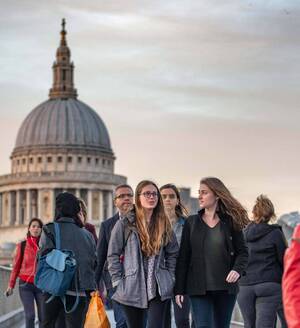 "
"
Studying abroad is an important part of the undergraduate experience and Notre Dame’s identity as an institution. The university recently released “Notre Dame in 2033: A Strategic Framework” which outlines the institution’s goals and priorities for the next decade. The report celebrates new data showing that 77% of undergraduates participate in a study abroad program, but also challenges a “deeper integration of those students into host cultures.” This effort to expand Notre Dame into a global university and embed undergraduates into host cultures through internships, research, language studies and global classes fits the university’s desire to prepare its graduates to be “global citizens.”
Notre Dame exports its culture, faculty, undergraduates and mission to eleven global locations: Beijing, Hong Kong, Mumbai, Jerusalem, Dublin, Kylemore Abbey, London, Rome, Mexico City, Santiago and São Paolo. Previously called global gateways and centers, these programs now have simpler names, such as “Notre Dame London.” Cory Hankins, multimedia specialist for Notre Dame International, says, “We believe that phasing these terms out can shift the focus toward the global impact we aim to achieve rather than focusing on explaining the difference between a gateway and center.”
Daniel Schwake is the executive director of the University of Notre Dame at Tantur, the home of the university’s long-standing Jerusalem study abroad program. After a career in consulting, Schwake came to Notre Dame in 2019.
“It [Jerusalem] is a place of the Bible but also of immense geo-political importance,” he said. In many ways, Jerusalem is one of the most unique global locations precisely because of its proximity to political conflict. “This is a complex place. The university considers the safety of the students first and foremost, knowing that Jerusalem comes with certain limitations and challenges. However, it also comes with immense and distinct opportunities to grow”
Last year, sixty undergraduates embarked upon the semester programs in Jerusalem. The program is currently suspended due to the Israeli-Hamas conflict, but Schwake is hopeful the undergraduate program will resume in 2025. Undergraduates in the Jerusalem program are given the opportunity to study at both an Israeli university and a Palestinian University, in addition to their classes directly through Notre Dame.
Over 2,000 miles away from Jerusalem, you can find a much different undergraduate study abroad program at Notre Dame London.
Students studying at Notre Dame attend classes in Fischer Hall, the academic and administrative building that sits just steps away from Trafalgar Square. Notre Dame London has the capacity for 196 students each semester and 100 students for the summer session. Students take all of their classes directly through Notre Dame, instead of using “host universities” such as Notre Dame Jerusalem or Notre Dame Rome.
John Copeland, executive director of Notre Dame London, explains that having all classes through Notre Dame makes London a well-suited program for pre-professional students such as pre-med neuroscience students. “We are unique in the model here,” he says. “We are a pathway for pre-professional students who do pre-med to [study abroad].” Copeland explained that the site’s curriculum, design and control provide students with unparalleled opportunities.
The programming opens up the possibility of studying abroad to students from all colleges, creating the largest cohort of any undergraduate semester program for the university. This gives students exposure to others in different disciplines but also a unique challenge to “burst” the Notre Dame bubble.
Copeland recognizes, though, that the structure of the Notre Dame London program poses a risk of an “end-to-end hermetically sealed Notre Dame.” With Conway Hall as the primary residence for Notre Dame London students, the program can look very similar to the campus in South Bend. Yet, the classes in London, according to Copeland, seek to use the city as a classroom and expose the students to more than just the “touristy side” of London.
These are transformative and transformational years, says Copeland. “You’re finding your own friend networks. You’re starting to understand what’s most important to you. You’re seeing your own formation in emotional ways and spiritual ways,” he says. Copeland explains that the program aims to support students as they grow practical skills such as cooking and taking public transportation.
Notre Dame London isn’t the only gateway that struggles with the idea of a “Notre Dame bubble.” On a Thursday afternoon at Notre Dame Rome, steps from the Colosseum, executive director Silvia Dall’Olio observes the “pendulum,” her way of describing that students' experiences range from building community with only fellow Notre Dame students to a total immersion into the host culture.
“We want to make sure we can respond, at an individual level, to students’ wants and needs,” said Dall’Olio. Notre Dame Rome has even gone so far as to find a water polo team for a student to continue their sport while abroad. Though there are great advantages to immersing oneself in Rome, Dr. Dall’Olio also notes that the residential villa in Rome offers nervous students a semblance of home.
“Post-pandemic, the community was very important,” she says. Students were coming to Rome specifically wanting to regain some of the community that they lost during the pandemic. Yet, as time passed, students have been asking for more immersive opportunities. In Rome, there are residential programs such as homestays or apartments with other study-abroad students to allow students to seek an opportunity to immerse themselves in a study-abroad experience that extends beyond the Notre Dame community.
As the university continues to build its global brand, the physical presence in certain areas anchors these efforts. In Rome, Dall’Olio calls it the “institutional commitment” to the city. The gateway often hosts events, symposiums and other activities for academics, current students and respected leaders to engage in dialogue with one another. The resources of the university’s investment, according to Dall’Olio, allow students not only to go to a different country for a semester but also to build on their academic pursuits in a diverse way.
Dall’Olio said, “It’s what makes us a truly global university.”